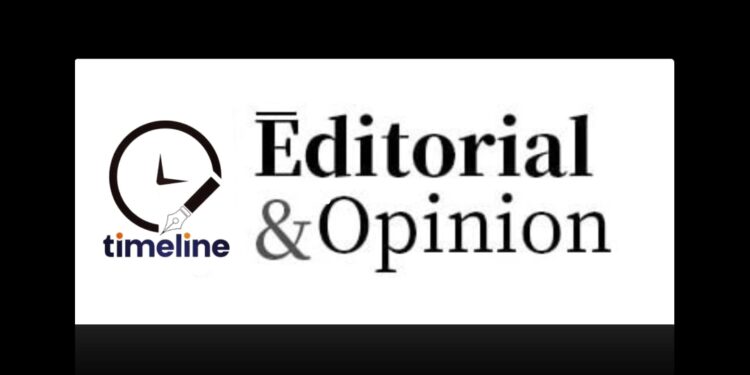Written By: Abdul Basit Alvi
A fair and efficient justice system is essential in any democratic society. It not only upholds the rule of law but also protects individual rights and freedoms. In this regard, the state has a vital duty to ensure that the justice system operates quickly and effectively.
Delays in legal proceedings can violate individual rights, particularly in criminal cases, where the accused may face prolonged detention or damage to their reputation. An efficient justice system fosters public trust in legal institutions; when citizens witness timely resolutions, they are more likely to believe in the system’s integrity. Swift justice can also deter criminal behavior, as individuals recognize that legal consequences will follow promptly. Resolving disputes quickly helps maintain social order—unresolved issues can lead to unrest, while a responsive justice system promotes societal harmony.
The state has several key responsibilities to facilitate a speedy justice system. It must allocate sufficient resources to the judiciary, including funding for courts, hiring more judges, and improving infrastructure. A lack of resources often results in backlogs and delays, undermining the system’s effectiveness. Regular reviews and reforms of legal frameworks are necessary to address causes of delay, which may involve streamlining processes, eliminating unnecessary steps, and instituting time limits for various legal stages.
Embracing technology can greatly improve efficiency. Implementing case management systems, online filing, and virtual hearings can help streamline processes and minimize delays. A strong technological foundation allows for better case tracking and court schedule management. Investing in training for judicial personnel, such as judges and clerks, is crucial for enhancing system efficiency. Ongoing professional development ensures that judicial officers are well-equipped to handle cases effectively.
The state should also promote alternative dispute resolution methods like mediation and arbitration. These approaches can yield faster resolutions without lengthy court processes, easing the burden on the formal justice system. To create a more efficient system, the state must collaborate with various stakeholders. Engaging lawyers, bar associations, and legal aid organizations can provide valuable insights and support for reforms aimed at expediting the justice process. Involving civil society organizations can raise public awareness about the importance of timely justice and garner community support for reforms. Collaborating with international organizations can introduce best practices and resources to strengthen the justice system.
A speedy justice system offers significant benefits to society. It reinforces the rule of law, ensuring fair and consistent application of laws. Prompt justice holds individuals and institutions accountable, fostering a culture of responsibility. Moreover, a swift justice system can attract investment, as businesses prefer environments where legal disputes are resolved efficiently, contributing to economic growth. When people have confidence in the justice system, they are more likely to resolve disputes peacefully, enhancing overall societal well-being and reducing the likelihood of violence or vigilantism. The state is tasked with finding solutions and appropriate alternatives to ensure a swift justice system.
Constitutional courts are crucial in protecting the fundamental principles of democracy and upholding the rule of law in a nation. These specialized judicial bodies interpret and enforce constitutional provisions, ensuring that laws and government actions are in line with constitutional principles. Their significance cannot be overstated; they act as guardians of individual rights, arbiters of political disputes, and stabilizers of democratic governance.
One of the primary roles of constitutional courts is to safeguard individual rights and liberties. In many democracies, these courts have the authority to review laws and government actions to ensure they do not violate constitutionally guaranteed rights. This judicial review serves as a check on legislative and executive powers, enabling citizens to challenge potentially unconstitutional laws. Landmark decisions on freedom of speech, equality, and due process often emerge from constitutional courts, establishing essential precedents that influence societal norms and values. These courts uphold the principle of constitutional supremacy, which asserts that the constitution is the highest law of the land. By reviewing and nullifying laws that violate constitutional provisions, constitutional courts ensure that all branches of government operate within their legally defined limits. This role is crucial for maintaining the balance of power and preventing any branch from exceeding its authority, thus preserving democratic integrity.
In many instances, constitutional courts mediate political disputes, particularly those related to electoral processes, political party regulations, and the legitimacy of government actions. Their rulings can provide clarity and stability during political unrest, helping to prevent conflicts from escalating. For example, constitutional courts often resolve disputes over election results or the constitutionality of political party actions, facilitating peaceful transitions of power and reinforcing public confidence in the democratic process.
These courts also play a vital role in promoting social justice by interpreting laws in ways that advance equality and address historical injustices. Their decisions can mandate reforms that benefit marginalized communities, ensuring fair application of laws across society. By championing social change, constitutional courts contribute significantly to building a more equitable society.
Furthermore, by providing authoritative interpretations of constitutional provisions, these courts offer legal certainty and predictability, which is crucial for individuals, businesses, and government entities alike. This clarity helps establish a clear understanding of rights and responsibilities under the law, facilitating better governance and promoting economic stability by defining legal expectations.
Constitutional courts also fulfill an educational role, raising public awareness about constitutional rights and the legal system. Their decisions often attract significant media attention and public discourse, informing citizens about their rights and the importance of civic engagement. This function is vital for a vibrant democracy, as it empowers individuals to advocate for their rights and hold the government accountable.
Many countries around the world have constitutional courts that perform effectively in their respective contexts. A prominent example is Germany’s Federal Constitutional Court (Bundesverfassungsgericht), established in 1951, which has the authority to review laws and government actions to ensure they comply with the Basic Law (Grundgesetz). The court has been instrumental in protecting human rights, particularly through landmark rulings that uphold freedom of expression and equality. Its decisions are binding on all branches of government, reinforcing the principle of constitutional supremacy. Established in 1956, Italy’s Constitutional Court (Corte Costituzionale) ensures that national laws comply with the Italian Constitution. It has the authority to annul laws deemed unconstitutional and to resolve disputes among various branches of government. Its rulings have profoundly shaped Italian law, especially concerning civil rights and liberties, making it a cornerstone of the country’s legal system.
Similarly, the Constitutional Court of South Africa, established in 1994 after the end of apartheid, plays a vital role in the nation’s democratic framework. The court is responsible for interpreting the Constitution and safeguarding human rights. The court has delivered several landmark rulings that have advanced social justice, particularly those affirming the rights of marginalized groups and addressing land reform issues. Its influence goes beyond legal decisions, often shaping national discourse on human rights and equality.
Spain’s Constitutional Court (Tribunal Constitucional), established in 1978, has the authority to review laws and protect rights enshrined in the Spanish Constitution. It plays a key role in mediating conflicts between regional and central governments, ensuring that Spain’s decentralized structure adheres to constitutional limits. Its rulings have tackled important issues, including language rights and regional autonomy.
Taiwan’s Constitutional Court (Council of Grand Justices), established in 1949, interprets the Constitution and reviews the constitutionality of laws. The court has also made pivotal decisions regarding human rights.
Austria’s Constitutional Court (Verfassungsgerichtshof), established in 1920, reviews laws to ensure compliance with the Austrian Constitution. It has the power to annul legislation and has been instrumental in protecting civil liberties and resolving constitutional disputes. Its decisions have often led to significant reforms in Austrian law and governance.
In contrast, Pakistan’s court system faces numerous challenges that affect its efficiency, credibility, and accessibility. While the judiciary is vital for upholding the rule of law and protecting citizens’ rights, systemic issues hinder its effectiveness. One major concern is the substantial backlog of cases; courts are overwhelmed with high volumes of cases, leading to long delays in the judicial process. This backlog frustrates litigants seeking timely justice and strains judicial resources, with many cases taking years or even decades to resolve, undermining public confidence in the system.
Access to justice is a significant challenge, particularly for marginalized communities. Geographic barriers, economic constraints, and a lack of legal awareness hinder many individuals from seeking legal recourse. Rural areas are especially impacted by a shortage of legal representation and resources, making it difficult for residents to effectively navigate the judicial system.
Corruption within the judiciary further erodes public trust, with allegations of bribery, favoritism, and unethical practices undermining the integrity of the court system. The lack of transparency in judicial proceedings and decision-making processes exacerbates this issue, leading to perceptions of bias and injustice. Political influence in the judiciary is a major concern in Pakistan. Interference from political entities can compromise the independence of the courts, resulting in biased rulings and undermining the rule of law. This issue is especially evident in high-profile cases, where political pressure can sway outcomes, further eroding public trust in the judicial process.
Although Pakistan has a comprehensive legal framework, gaps and ambiguities exist that can complicate legal proceedings. Outdated laws and inconsistent application of legal principles create confusion and impede the pursuit of justice. Moreover, the absence of specialized courts for specific case types lead to inefficiencies and delays.
The process of appointing judges in Pakistan has also faced criticism for its lack of transparency and accountability. Political considerations often influence judicial appointments, raising concerns about the impartiality of the judges. Furthermore, the mechanisms for holding judges accountable for misconduct are inadequate, leading to a lack of accountability within the judiciary. Many courts in Pakistan face resource limitations that hinder their effectiveness. Insufficient staffing, inadequate facilities, and outdated technology obstruct the efficiency of judicial processes, resulting in prolonged trials and increased frustration for both litigants and legal practitioners.
A significant barrier to effective justice in Pakistan is the general lack of public awareness regarding legal rights and processes. Many individuals are unaware of their rights or the procedures for seeking justice, which can create reluctance to engage with the judicial system. Enhancing legal literacy and launching public awareness campaigns are crucial for empowering citizens and encouraging greater participation in the courts.
The backlog in the Pakistani judicial system has reached alarming levels, severely impacting the delivery of justice in the country. With millions of pending cases across various judicial levels, this backlog frustrates litigants and undermines public confidence in the legal system. Recent reports indicate that the total number of pending cases in Pakistan’s courts exceeds 2 million, encompassing cases from district courts to the Supreme Court. Lower courts bear the brunt of this backlog, with over 1.9 million cases pending in district and session courts alone. High Courts also contribute to the backlog, with hundreds of thousands of cases awaiting resolution.
Several factors contribute to the growing backlog in Pakistani courts. Many courts lack the necessary infrastructure and resources to manage the high volume of cases. Insufficient staffing, outdated facilities, and limited technological support impede efficient case management. Additionally, the number of cases filed in Pakistan continues to rise due to various social, economic, and legal issues, overwhelming the existing judicial framework. Frequent adjournments, delays in appointing judges, and procedural complexities often prolong case resolution, leading to frustration and disengagement among litigants.
Moreover, many individuals remain unaware of their legal rights and the processes for pursuing justice, which exacerbates the number of filings and complicates cases. The backlog has serious implications for the Pakistani legal system. Prolonged delays in case resolution prevent many individuals from obtaining timely justice, particularly in urgent matters such as human rights violations, child custody, and property disputes. This growing backlog contributes to public disillusionment with the judiciary; when citizens perceive the system as inefficient, their trust in the rule of law diminishes, leading to a decline in compliance with legal norms. Prolonged litigation often leads to increased legal costs for litigants, adding an extra financial burden for those pursuing justice. Acknowledging the backlog issue, the Pakistani government and judiciary have taken steps to address this problem. Some courts have introduced case management systems designed to streamline processes and minimize delays. These initiatives include establishing timelines for case hearings and actively managing pending cases. While there have been efforts to increase the number of judges across various courts, the pace of these appointments remains slow compared to the growing backlog. Promoting alternative dispute resolution (ADR) mechanisms, such as mediation and arbitration, can help ease the burden on courts by providing quicker resolutions to disputes outside the formal judicial system.
Despite these efforts, the situation in Pakistani courts remains dire. To address these issues, the establishment of a Federal Constitutional Court (FCC) is essential to eliminate provincial disparities. The proposed FCC will be part of a broader legislative initiative that the government intends to introduce under the Constitutional Package. According to the reported draft, the government aims to add Article 184(A) to the Constitution, granting the FCC the authority to interpret the Constitution and hear appeals against laws passed by Parliament. Similarly, under the proposed Article 184(A)(2), the FCC would also hear appeals against decisions made by high courts. Another proposed change involves transferring all pending appeals against high court orders to the FCC once the constitutional amendment is enacted. Additionally, the government plans to amend the Constitution to grant the FCC “exclusive and original jurisdiction,” apart from the Supreme Court, to resolve disputes between federal and provincial governments.
The concept of constitutional courts is not new and exists in many countries around the world. If we aim to strengthen our judicial system, ensure speedy justice for our citizens, and eliminate disparities between provinces, the establishment of an FCC is essential.
Unfortunately, Pakistan lacks unity on core national issues from our political parties and leaders. In today’s complex and rapidly changing world, the importance of unity on fundamental national issues cannot be overstated. Whether concerning economic stability, security, education, or public health, a cohesive approach is crucial for effectively addressing challenges. Unity promotes collaboration, enhances resilience, and ultimately leads to better governance.
Every nation is made up of diverse communities, each bringing unique perspectives and experiences. While this diversity enriches the national fabric, it can also lead to fragmentation in tackling core issues. Embracing unity does not mean ignoring differences; rather, it involves finding common ground to work together toward shared goals. By uniting on national issues, societies can harness their diversity to create inclusive solutions that meet the needs of all citizens.
National core issues often require multifaceted solutions that no single entity can address alone. A united front enables the pooling of resources, expertise, and ideas, leading to more comprehensive and effective problem-solving. For example, challenges such as climate change, public health crises, and economic inequality demand collaborative efforts from government, civil society, and the private sector. When stakeholders come together, they can devise innovative strategies that may not be possible in a divided environment. Unity fosters trust among citizens and between the public and government institutions. When people witness their leaders and communities collaborating on significant issues, it boosts their confidence in the system and fosters civic engagement. Trust is essential for effective governance; when citizens feel that their leaders are prioritizing the nation’s best interests, they are more inclined to cooperate and make positive contributions to society. Pakistan encounters a variety of challenges, both internal and external, ranging from economic downturns to security threats. A unified approach allows for a more resilient response to challenges. In times of crisis—be it a natural disaster or a public health emergency—such unity facilitates quicker mobilization of resources and support. For instance, during the COVID-19 pandemic, countries that successfully rallied their populations around public health measures were more effective in controlling the virus’s spread. A collective stance on key national issues can enhance democratic processes by fostering dialogue and constructive debate. When citizens unite to tackle shared concerns, it encourages active participation in democracy, from voting to advocacy. This collective engagement ensures diverse voices are heard, leading to more representative and responsive governance. In an increasingly interconnected world, nations that present a united front on core issues are better positioned to compete globally. Whether negotiating trade agreements, addressing climate change, or responding to international crises, a cohesive national stance boosts a country’s credibility and influence. Unity conveys strength and stability, which can attract investment and partnerships. Moreover, unity on national issues fosters a sense of belonging among citizens. When individuals feel connected to a common purpose, it enhances social cohesion and national identity. This sense of belonging is vital for promoting patriotism and civic responsibility, inspiring individuals to contribute positively to their communities and the nation as a whole.
Regarding Pakistan’s judicial system, it appears primarily focused on political and constitutional matters, resulting in delays and frustration for the public. Courts should not prioritize political and constitutional issues at the expense of addressing citizens’ concerns. Our Supreme Court is heavily occupied with constitutional and governmental matters, making it challenging to promptly address various cases that come from high courts for review, often leading to years of delays. The proposed constitutional courts aim to alleviate this burden on the Supreme Court, allowing it to focus on resolving regular cases more swiftly. These constitutional courts will also help reduce the lengthy and delayed justice process by handling constitutional and governmental issues separately.
The people of Pakistan deserve swift justice, and it’s unfair for our courts to be bogged down by political cases while public issues are neglected. The proposed establishment of Constitutional Courts is a timely and effective solution to the current crisis and backlog in our judiciary. The citizens recognize its significance, and it is crucial for politicians to demonstrate the same commitment. They should prioritize the state’s interests over personal agendas and unite in support of this important initiative.

























